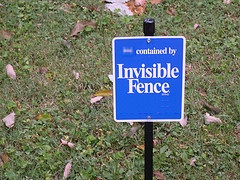 Raising a child with disabilities is like living in a yard with an invisible fence.
Raising a child with disabilities is like living in a yard with an invisible fence.
The trouble with an invisible fence is that you only learn where the perimeter is when you make the mistake of crossing the unseen barrier and get zapped by life telling you that you aren't allowed to go there.
Maybe it's a place like a preschool that doesn't want your child. Maybe it's a friendship that fades away as your lives take different paths. Maybe it's an expectation - like how holidays will look or what activities your family is going to participate in.
Over time you are trained not to go too far in this direction or that. You choose certain activities over others so as to avoid the shock. And you balance learning to live well inside the lines with taking risks to test the boundaries.
Of course we've pushed the limits many times. Though severely impaired, our son Alex was in inclusion for 5 years and did therapeutic horseback riding. We've been creative and adaptive - like finding different ways of bike riding and bowling and vacationing - all to fit our funky family needs.
But perhaps the hardest lesson about this fence is that it can get smaller. You discover that something that was once inside the line isn't anymore. Like the first time my son was left out of a birthday party that in years past he had been invited to. Or when it no longer made sense to have him in a regular class. And while new solutions do materialize like awesome self-contained classes at Forsythe MS and then Pioneer HS, after almost 19 years of parenting a child with severe disabilities the zaps have left some scars.
Of course, I know that many people have their own invisible fences. Divorce, adolescent troubles, aging parents, financial strife, diagnoses of cancer or other debilitating conditions, mental illness, and even prejudice - create their own barriers and bring their own confinements.
But even knowing that, sometimes I get jealous of others anyway.
Recently, during my kids' school break, I saw facebook entries from friends with similarly-aged children. Several families were traveling in Europe. One was on a cruise. One was in Hawaii. And more than one was enjoying the ski offerings of northern Michigan.
While for some people these trips are out of reach because of financial hurdles, we have the added challenge of how any of it is doable with Alex. Every vacation we have had in the last 10 years was not really a 'vacation' because it involved 24/7 care of Alex. And unfortunately, as he has gotten older, travel has become only harder.
Like I said, usually we can deal with this. We have a decent life with many advantages on this side of the fence. The trouble is that while Alex's world is small, my other two sons' lives should be expanding. And it's hard to grapple with the fact that they are getting gypped.
My 16 and 13 year old sons are amazing. They have lived much of their lives not knowing if plans will materialize, if holidays can be counted on, if mom and dad will be available or even awake when we should.
Now old enough to be our back-up caregivers, they sometimes need to feed their older brother, and unfortunately even deal with him suddenly, spontaneously throwing up. And other than complaining about that last task, they never show resentment for this responsibility which neither of them ever signed up for. That is why, though I do believe, on so many levels, that their family circumstances have many invaluable life lessons to offer, I regret that we can't offer them a bigger yard.
With that in mind - I got it in my head that my able-bodied sons deserved to experience a weekend ski get away. Even if it meant leaving Alex behind.
This is a hard thing to do - both emotionally for me (though Alex can't physically and cognitively comprehend skiing) and practically - as in all the details to pull something like this off. At any moment that zap could come. The big worry is that he could get sick. But we also had to make sure that our one respite worker was available on the same weekend as my husband and kids. We had to have the money - which between the sport itself, the accommodations, and the cost of respite care is pretty steep. Oh and the weather had to be not too cold, not too warm, not too wet and there still had to be snow!
I have to admit that the effort to get around this fence threatened to outweigh the benefit for me. But I am happy to report that from Saturday at 3 pm until Sunday at 7 pm we were able to go away and enjoy a 'typical' family ski weekend. Of course it wasn't the ideal but in our life it was a success. We pushed the limits and found a way to add some adventure and a little well deserved fun.
I imagine I will always struggle with the challenges of this invisible fence. But I do take care not to spend too much time envying other's grass because it doesn't make mine grow any better. The best I can do is try to make our yard as nice as possible, keep the edges from closing in, and work to appreciate our rare opportunities - no matter how brief or imperfect - for a change of scenery.
Annie Zirkel, LPC is an Ann Arbor parenting consultant and former editor of A Different Path - A Washtenaw, Mi newsletter for families raising children with special needs. To contact her, or to get on the mailing list for this free, quarterly publication contact her at annie@practicehow.com
Creative Commons License photo credit:cloudsoup